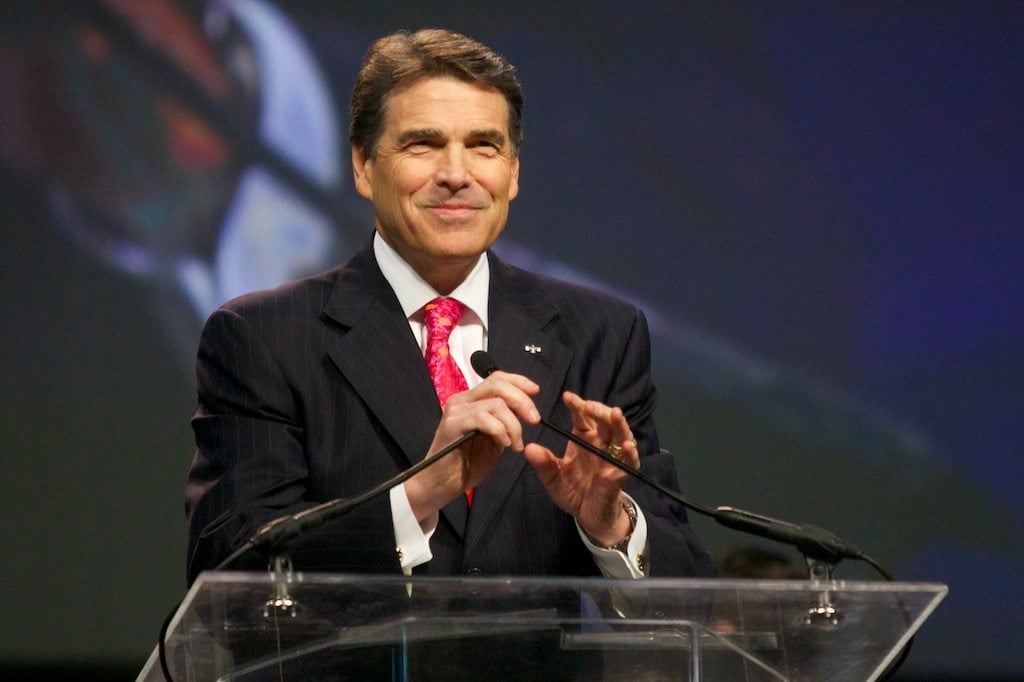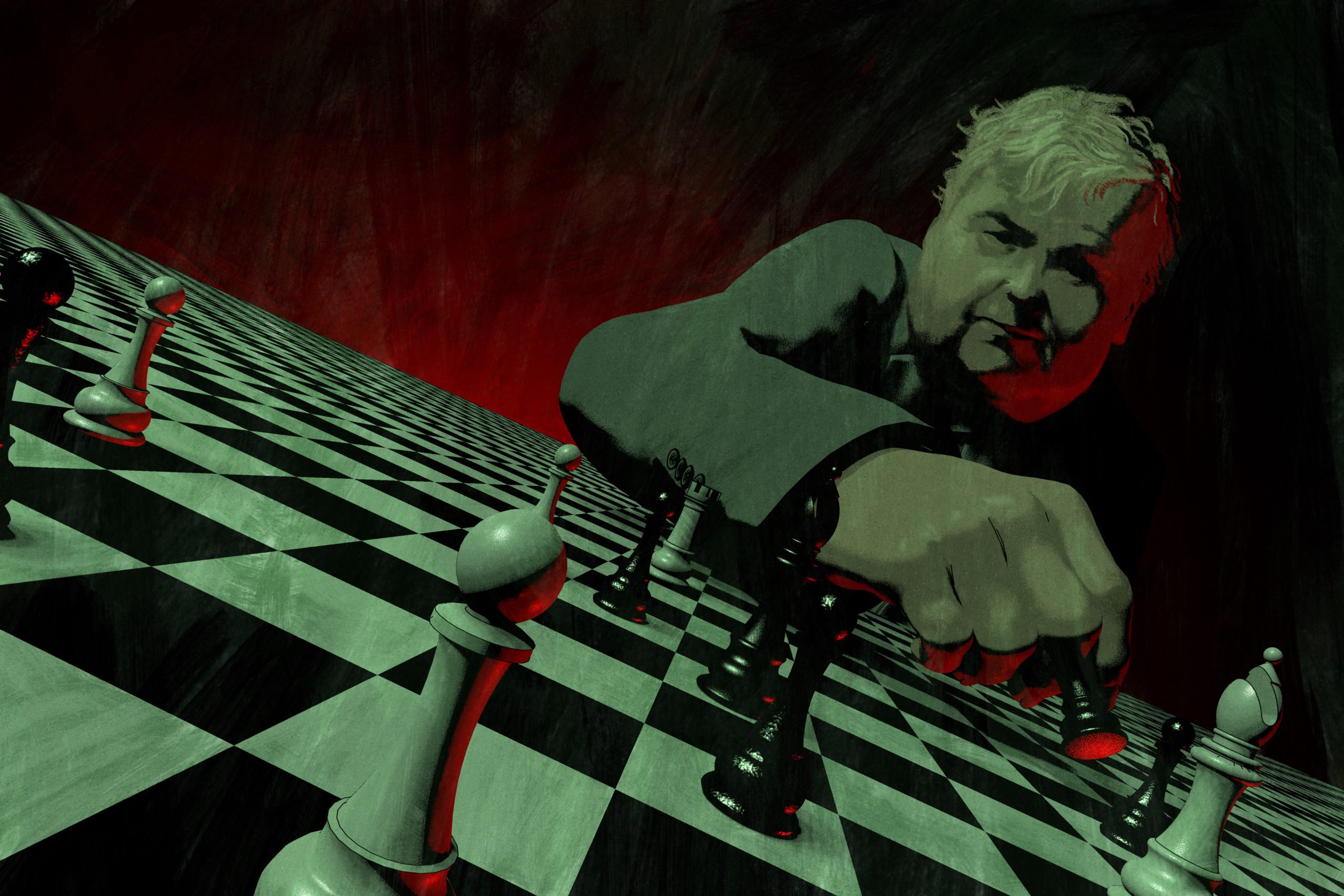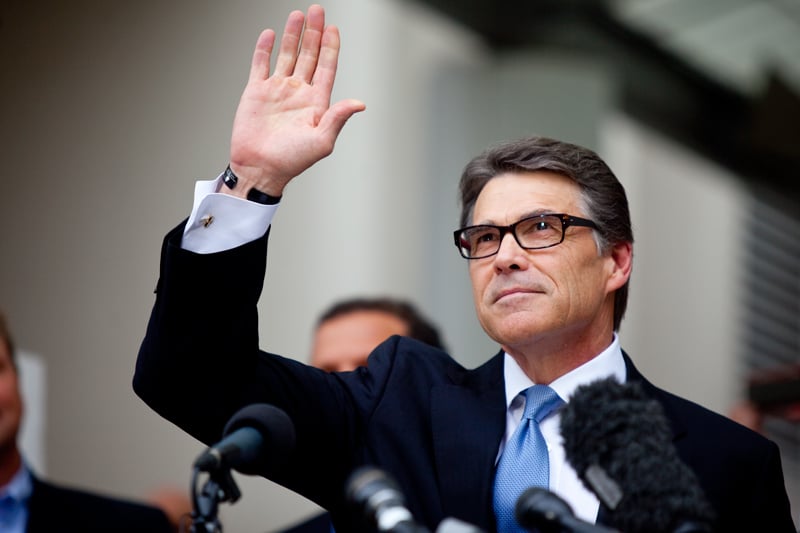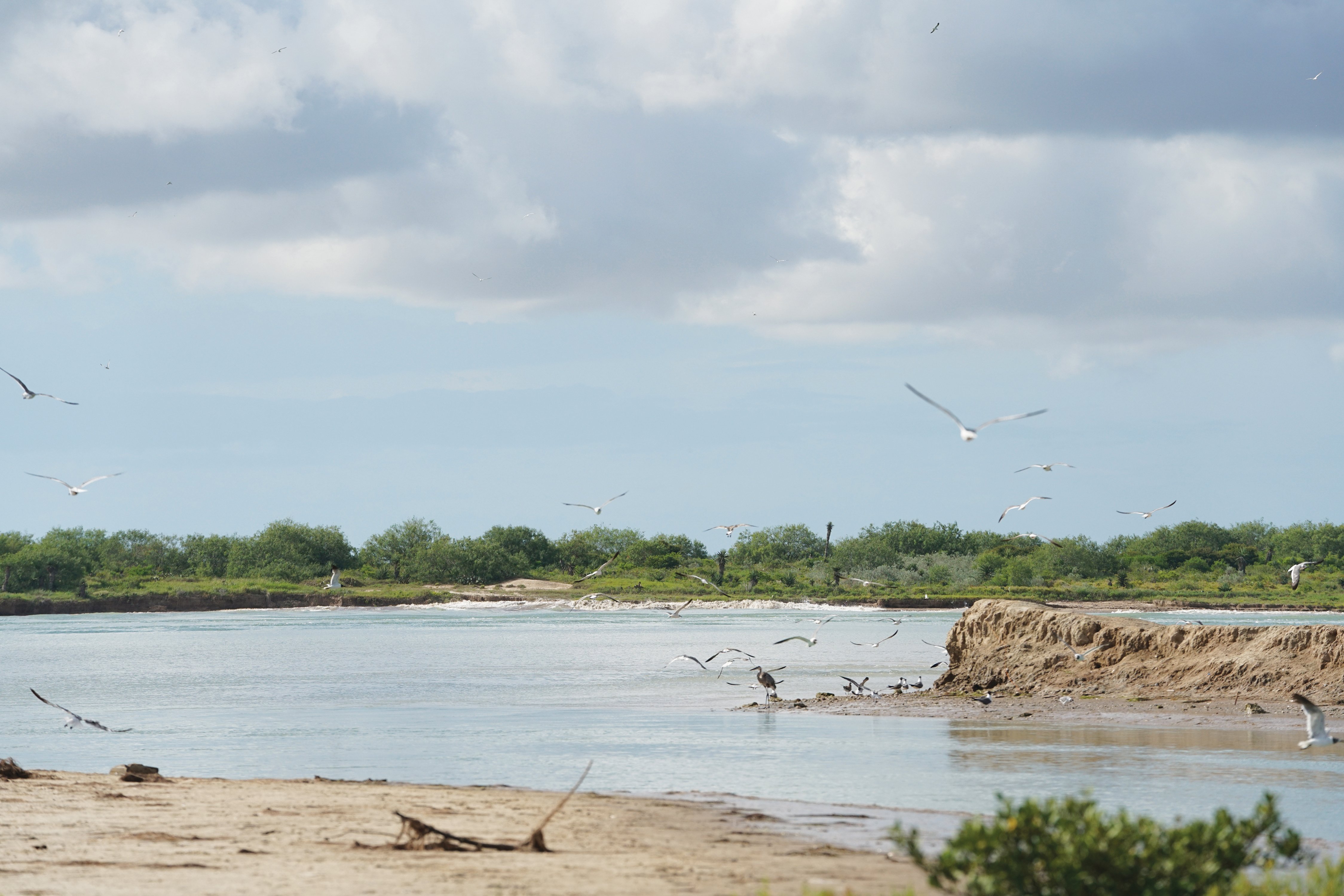
Five Reasons Rick Perry Shouldn’t Run for President Again
The Texas governor is reportedly considering another run at the White House. Good luck with that.

Above: Rick Perry at "The Response" in August 2011
You have to admire Rick Perry’s resilience. After enduring what some political pundits call the worst presidential campaign ever, most people wouldn’t want to try again.
But the Texas governor is reportedly considering another White House run in 2016, and a number of political insiders keep talking about it, including Perry himself. Over the summer, he told NBC News that he would consider another run for president, and he said last week that he would reveal his plans in July 2013, according to the Rio Grande Guardian. Perry might simply be posturing so Texas lawmakers won’t view him as a lame duck entering the Texas Legislature’s 2013 session. But other Republicans are talking up the prospect too, including Grover Norquist, according to Huffington Post.
Perry, of course, is a tarnished politician. Many liberals view him as a bumbler, and conservatives don’t seem too enamored with him either. Republicans got a good look at Perry in 2011, and many didn’t like what they saw. In Iowa, where he campaigned vigorously, Perry finished a distant 5th, receiving just 10 percent of the caucus vote. That was his best performance. In New Hampshire, he got less than 1 percent. After that, he dropped out.
With that record, it’s hard to imagine a reality in which Perry is a viable presidential contender, but some Perry boosters are apparently trying to create it. They want to turn back time, like Superman racing around the Earth, to the short period, in August 2011, when Perry was the GOP frontrunner. Back then, before his many travails, he was widely viewed as a talented campaigner with a commendable economic record entering an extremely weak field of candidates.
When supporters do discuss Perry’s disastrous campaign, they often blame his troubles on correctable problems: entering the race too late and lingering pain from back surgery. Perry consultant Dave Carney told the Campaign Managers Conference at Harvard University last week that Perry’s back pain had a “big impact” on the campaign, according to The Washington Post. “The whole campaign was built on a very aggressive, arduous schedule of travel in order to make up for lost time,” Carney said, according to the Post. The pain robbed the governor of sleep, Carney said, and made it “more difficult to study, more difficult to be comfortable.”
With an earlier start and no back pain, perhaps Perry could perform better and resemble the candidate who never lost a race in two decades in Texas politics. That might rehabilitate his image among voters. But even if he could improve his standing with the electorate, there are still strong political arguments against a second run at the presidency. Here are five reasons why “Rick Perry in 2016” would likely be a losing proposition.
1. He was bad last time.
The people talking about Perry’s candidacy seem to forget, or down play, just how atrocious he was. It wasn’t just some unfortunate debate performances. He was really bad. Unimaginably, even historically, bad. It was so much more than the “oops” moment. You never want to commit perhaps the greatest debate gaffe in the history of American presidential politics, but “oops” didn’t sink Perry. He was finished even before he uttered that delicious four-letter word.
We simply don’t have space to list all his mistakes, but here’s a sampling: Threatening the chief of the federal reserve with bodily harm; saying that Warren Buffett of all people didn’t understand the private sector; the ranch-name controversy; saying Republicans who opposed in-state tuition for illegal immigrants lacked a heart; fumbling his flip-flopper attack on Mitt Romney so badly that you had to wonder if English was his first language; the bizarre, giddy speech in New Hampshire after which Perry treated his parting gift—a bottle of maple syrup—like the Nobel Peace Prize; saying the U.S. should consider sending troops into Mexico; responding to his first question in a debate all about the economy by saying he didn’t have a jobs plan but would have one soon; saying the book that most influenced him was “The Road to Serfdom” by Fredrich von Hayek, a canned political answer that gave voters no insight into who Perry really is; telling students at Dartmouth that the American Revolution was fought in the 16th century (it’s one thing to get the year wrong, it’s something else to miss by two hundred years); and his homophobic television ad that conflated gays in the military with prayer in schools and that seemed to backfire among Republicans.
Because of that performance, Perry finished behind flawed, under-funded candidates like Rick Santorum, Herman Cain, Newt Gingrich and Ron Paul.
Chris Cillizza at the Post recently named Perry the worst candidate of 2012. He earned the distinction on merit.
2. He could do better next time but not that much better.
If Perry runs in 2016, he would undoubtedly perform better. It would be hard to be worse. Entering the race earlier would help. Learning from his experience the first time would too. If you believe the claims about Perry’s back surgery, then perhaps a pain-free campaign would lead to better results.
But how much better could he be? He can’t change who he is. And he’s a man who’s never been that interested in policy. He couldn’t compete with Mitt Romney’s depth of knowledge. He’s not an expert on federal domestic policy, foreign policy or the workings of the federal government—which is what led to the oops moment—and he’s gaffe-prone in debates and on the campaign trail. As Perry learned, small mistakes or odd comments on the trail—mistakes that would be one-day stories in the Texas media—become major controversies during a presidential campaign. In national politics, the media goes into feeding-frenzy mode quickly. Unlike Texas, where media outlets seem reluctant to pick up each other’s stories, national reporters feed off each other. This dynamic helped sink Perry.
Other under-reported Perry scandals could still lurk out there. Perry’s campaign imploded so quickly, some national reporters (and local ones too) gave up their big Perry investigations. His record as governor provides plenty of material. For instance, anyone who thinks Solyndra is a big deal should check out the Texas Enterprise Fund, the Emerging Technology Fund, and, now, the Cancer Prevention Research Institute of Texas. Perry’s next campaign would surely not be scandal free. But even if he could overcome these challenges, there’s another issue.
3. He could have trouble fund-raising.
Money is the life-blood of politics, and Perry had plenty of it last time. In his first three months in the 2012 race, Perry raised an impressive $17 million from 22,000 contributors in all 50 states—the most campaign money of any Republican this side of Mitt Romney.
That won’t be the case in 2016. Big donors don’t usually give to tarnished candidates. Perry likely will still have his Texas fund-raising base—Bob Perry, Harold Simmons and friends. But that might not be enough. A viable presidential contender must solicit money from GOP donors across the country. Perry was already having trouble raising funds by the end of his last campaign. Last November, one Perry supporter told the Houston Chronicle that he held a fundraiser and no one showed up. “It’s the iron rule of politics: Money follows popularity,” Austin political insider Bill Miller told the Chronicle at the time. “It goes up if you’re popular and goes down if you’re not.”
Exactly. Perry’s early struggles and drop in the polls snuffed out his fund-raising. Any further gaffes in 2016 would only harm his efforts.
But even if he could run a largely gaffe-free campaign and raise his popularity, Perry still might have trouble raising money because…
4. The field will be much stronger.
This may be Perry’s biggest problem. Most of the major Republican presidential contenders sat out 2012 because they didn’t want to challenge a sitting president. So Perry entered a weak field in which Herman Cain, Michele Bachmann and Newt Gingrich would all be “frontrunners” at some point. And the strongest candidate, Romney, was loathed by the party base.
In 2016, with no presidential incumbent, the GOP field will be talented: Marco Rubio, Chris Christie, Paul Ryan, Mike Pence, Mitch Daniels, Jeb Bush, and Bobby Jindal are potential candidates. Every one of these people is more popular within the party than Perry at the moment. Not to mention other rising stars who could emerge between now and 2016 (Ted Cruz, anyone?).
All these people will be sucking up campaign money and media attention. Perry will be old news. And that’s why….
5. There are few second acts in presidential politics.
Comebacks on the presidential level are rare. Ronald Reagan lost a primary and later won the White House. So did George H.W. Bush. But they’re the exceptions.
Reagan’s experience, and Bush’s too, don’t relate to Perry. Reagan lost the 1976 GOP primary, but he performed extremely well. Reagan nearly upset Gerald Ford, the sitting president of his own party. By the time Reagan ran again in 1980, he was a hero among conservatives and favorite to win the nomination. And he was Ronald Reagan—one of the most charismatic and talented politicians in American history. Does any of this apply to Rick Perry’s situation?
Then there is Bush. Here again, the losing candidate performed well in his first race. He finished second to Reagan in 1980 and, on the strength of that performance, earned a place on the ticket. He served as vice president for eight years and only then won the White House. None of that offers solace for Perry.
Second acts are rare because voters like fresh faces—candidates they can get excited about, not retreads from four years earlier. And if they’re going to vote for a retread, it’s a retread they can get excited about because that candidate performed so well in the previous campaign.
A few politicians the past 40 years lost a primary campaign but later came back to win the presidential nomination, though not the general election.. Bob Dole (1988) and John McCain (2000) performed well in their losing primaries, finishing second to the eventual nominee. Neither were especially formidable candidates the next time around, but they took advantage of weak fields to win the nomination—and both were blown out in the general election.
The one candidate whose experience might offer precedent for Perry is, ironically, Mitt Romney. His first race, in 2008, wasn’t much to look at—though he did win the Michigan primary, which is more than Rick Perry can say—and of course he came back to capture the nomination in 2012. But Romney capitalized on the same weak competition that Perry lost to. Romney became nominee almost by default. Perry won’t have that option against a strong field in 2016.
Most candidates whose campaigns implode and who fail to finish in the top three in a single primary or caucus don’t come back for more. Did anyone ever talk about Wesley Clark or Fred Thompson or John Connally running for president again? Lamar Alexander ran twice, with terrible results both times. They were all talented politicians who reached high levels of public life, but they were disasters in presidential campaigns. That’s the class Rick Perry is in right now.
Anything is possible. Sometimes the improbable does happen. Perhaps Perry will defy history and, free from back pain, will storm to the presidency. But at this point, the odds are long indeed.


